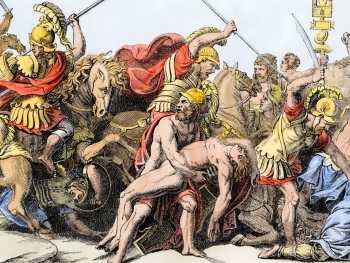
The modern form of health insurance, which is premium based, pooled risk financial coverage during illness is a relatively new development. But the thoughts which underlie it go back thousands of years. The formation of systems that would later develop into modern health insurance such as seeking affordable group health insurance that could be offered to larger groups of people was gradually formed through early societies, religious codes, and communal traditions.
The Early History of Mutual Care.
The Mesopotamian Early and the Code of Hammurabi.
The Code of Hammurabi (c. 1750 BCE) contains one of the earliest-known systems of medical accountability. Although it was not a form of insurance in the contemporary meaning, the code had standardized charges and punishment to the physicians. This established a foreseeable pattern of medical expenses and liabilities- a precursor to financial regulation in the medical sector.
Ancient Egypt
The medical texts of papyrus like the Papyrus of the Eber (c. 1550 BCE) show that the Egyptian temple economies frequently funded healers and supplied medicine through communal means. Pharaonic service workers such as pyramid laborers were provided with state-subsidized medical services on a collective basis- an early form of risk-sharing.
China and the Idea of Collective Responsibility.
The Chinese communities experienced collective welfare during the Zhou Dynasty (c. 1046-256 BCE), where families or clans assisted each other in the case of sickness. The concept of collective contributions and how they could shield people against disastrous occurrences was further formalized in mutual-aid societies in subsequent centuries.
Biblical Allusions to Community Care and Accountability.
Although the Bible is thousands of years older than modern insurance, it is full of references to communal responsibility, caring about the ill, and keeping the weak safe-values that form the basis of the modern health insurance.
- Exodus 21:18-19 describes the requirements of restituting damages to a person who suffers injury, such as compensating the time lost and making sure that they are completely healed. This is an ethical form of liability and healthcare expense account.
- Leviticus 13-14 outlines elaborate steps to address disease (particularly leprosy), focusing on community health, quarantine and priestly supervision- an early system of community health control.
- The book of Acts 2:44-45 describes the beginning communities of the Christian faith sharing resources to ensure that none of them were in need, which was a communal fund that was a social security net.
- The Parable of the Good Samaritan (Luke 10:25-37) emphasizes caring treatment, such as the Samaritan paying the innkeeper to continue the care of the wounded man, a powerful illustration of voluntary financial assistance of health care.
These Biblical motifs of collective responsibility and care of the ill resonate in subsequent systems of mutual insurance and social medicine.
Guilds, Brotherhoods and Early Insurance Models.
The Greco-Roman World
The city-states of Greece subsidized physicians (iatroi) who served the community, and direct expenses were lowered. Collegia were early professional associations of Romans, whose members were provided with funds in the event of sickness or injury. These are forerunners of the subsequent guild systems.
Medieval Europe and Friendly Societies.
In the Middle Ages, trade guilds, monastic orders, and confraternities offered benefits to members in the form of sickness benefits, funeral costs, and widows and orphan support. These mutual-aid arrangements were among the first proto-insurance plans, in which members contributed to a shared fund.
In England, the 17th and 18th centuries saw the thriving of the so-called friendly societies, which were collecting funds to provide assistance to the sick members who were unable to work.
The Birth of Modern Health Insurance and Industrialization.
The 19 th century changed the informal community assistance to the organized financial insurance of health coverage.
Sickness Funds in Europe
With the large number of industrial workers flocking in the factories, the chances of getting injured or sick rose tremendously. Otto von Bismarck initiated the Sickness Insurance Law of 1883 in Germany that made employers and employees make contributions. This is generally regarded as the first contemporary health insurance system: mandatory, voluntary, and controlled by the government.
Similar systems were adopted by other European countries in the near future.
Insurance in the United States and Employer-Based Insurance.
Prepayment plans such as the one by Baylor Hospital (1929) that became Blue Cross were introduced in American hospitals in the early 20th century. Health insurance through employers grew fast during the World War II when wage controls prompted employers to provide medical benefits rather than raise wages.
By the middle of the 20th century, employer-sponsored health insurance had become the model in the U.S., which ultimately resulted in the innovations of group coverage and the attempts at affordable group health insurance in businesses and to workers.
Current Trends and Persisting Iss.
The late 20th and early 21st centuries saw:
- Public programs, e.g., Medicare and Medicaid (1965).
- HMOs and managed care models
- Reforms of the Affordable Care Act (2010) were aimed at increasing access and avoiding the denial of care on the basis of preexisting conditions.
- Increased focus on value-based care, digital health, and preventive medicine.
In spite of the progress, the quest of equitable, sustainable, and affordable coverage, such as the current drive to achieve universal affordable group health insurance, is one of the key social and political concerns.
Health insurance did not appear out of thin air; it was developed over thousands of years by the communal norms, religious values, and primitive mutual assistance systems. The practice of medicine was controlled in ancient civilizations and collective healing was encouraged, whereas the biblical teachings encouraged compassion and collective responsibility towards the sick.
These ancient and religious underpinnings of health insurance systems are the pillars of modern health insurance systems--the timeless human values of mutual protection, fairness and care. The fundamental objective of providing people with the care they need without excessive financial strain has not changed throughout history as societies keep innovating in the sphere of healthcare financing.
Ancient History History Biblical References Biblical Research health insurance insurance ancient healthcare medical history public health healthcare


















